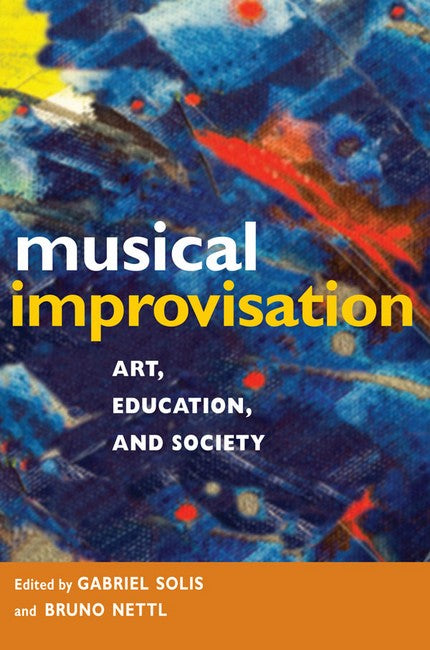Musical Improvisation: Art, Education and Society; Edited by Gabriel Solis and Bruno Nettl; Preface - Bruno Nettl; Introduction - Gabriel Solis; Part One: Society; 1. Jazz as Political and Musical Practice - Ingrid Monson; 2. John Cage and Improvisation: an Unresolved Relationship - Sabine M. Feisst; 3. When Traditional Improvisation is Prohibited: Contemporary; Ukrainian Funeral Laments and Burial Practices - Natalie Kononenko; 4. The Juncture between Creation and Recreation among Indonesian Reciters of the Qur'an - Anne K. Rasmussen; 5. Genius, Improvisation, and the Narrative of Jazz History - Gabriel Solis; 6. Formula, Variation and Improvisation in Participatory Music - Thomas Turino; Part Two: Education; 7. Learning to Improvise Music, Improvising to Learn Music - Patricia Shehan Campbell; 8. Improvising Mozart - Robert Levin; 9. Keyboard Improvisation in the Baroque Period - Charlotte Mattax Moersch; 10. Beyond the Improvisation Class: Learning to Improvise; in a University Jazz Studies Program - John P. Murphy; 11. On Learning the Radif and Improvisation in Iran - Bruno Nettl; 12. Hindustani Sitar and Jazz Guitar Music: A Foray into Comparative Improvology - Stephen Slawek; 13. Music Improvisation in the Modern Dance Class - John Toenjes; Part Three: Creation; 14. Representations of Music-Making - Stephen Blum; 15. Improvisation and Related Terms in Middle-Period Jazz - Lawrence Gushee; 16. Opening the Museum Window: Improvisation and its Inscribed Values in Canonic Works by Schumann and Chopin - Robert S. Hatten; 17. Improvisation in Beethoven's Creative Process - William Kinderman; 18. Why Do They Improvise? Reflections on; Meaning and Experience - A. Jihad Racy; 19. Preluding at the Piano - Nicholas Temperley; Contributor List; Index
Request Academic Copy
Please copy the ISBN for submitting review copy form
Description
''Cutting across traditional subject boundaries in music and cultural studies, this admirably comprehensive work adopts a welcome interdisciplinary ideal and makes a truly significant contribution to our knowledge of musical improvisation.'' Robert Witmer, professor emeritus of music, York University

